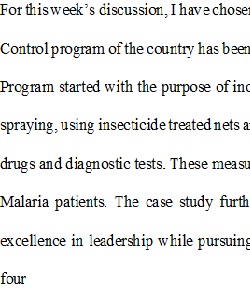


Q Please pick one of the case studies (Botswana, Zambia, Smallpox, Thailand, or China) and discuss what approaches were successful. How have interventions for global health epidemics been cost-effective focused, and what were the repercussions of these interventions? What are some of the setbacks and how do you think we could work around them in the future? Drawing from the Parker (2002) article about the unequal global distribution of diseases and prevention efforts, pick one of the "big three" communicable diseases (Malaria, TB, or HIV/AIDs) and analyze how prevention and treatment strategies have been affected by global politics and structural inequalities. Do global institutions such as the World Bank narrow or exacerbate these structural inequalities? Address
View Related Questions